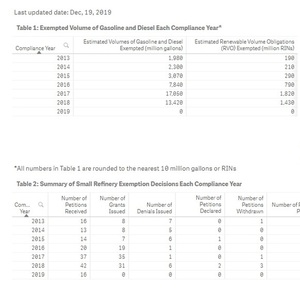EPA: 6 new SREs filed for compliance year 2019

December 20, 2019
BY Erin Krueger
The U.S. EPA released updated small refinery exemption (SRE) data on Dec. 19, reporting that six new SRE petitions have been filed under the Renewable Fuel Standard for compliance year 2019, up from 10 petitions that had been filed as of Nov. 21, 2019.
A total of 16 SRE petitions for compliance year 2019 have now been filed. All 16 are still pending. No SRE petitions are currently pending for any other RFS compliance year.
For compliance years 2015 through 2018, the EPA approved 85 of the 99 SRE petitions it has received. Those 85 approved SRE petitions allowed 38.31 billion gallons of fuel to be exempt from RFS blending requirements, equating to approximately 4.04 billion renewable identification numbers (RINs).
Additional SRE data is available on the EPA website.
Advertisement
Advertisement
Advertisement
Advertisement
Related Stories
The U.S. Department of Energy’s Office of Energy Efficiency and Renewable Energy is soliciting public comments on a preliminary plan for determining provisional emissions rates (PER) for the purposes of the 45Z clean fuel production credit.
On July 17, Iowa’s cost-share Renewable Fuels Infrastructure Program awarded $1.12 million in grants for 20 applicants to add B11 and 4 applicants to add E15 to retail sites. This was the first meeting following the start of RFIP’s fiscal year.
Par Pacific Holdings Inc., Mitsubishi Corp. and ENEOS Corp. on July 21 announced the signing of definitive agreements to establish Hawaii Renewables LLC, a joint venture to produce renewable fuels at Par Pacific’s refinery in Kapolei Hawaii.
A new study published by the ABFA finds that the U.S. EPA’s proposal to cut the RIN by 50% for fuels made from foreign feedstocks, as part of its 2026 and 2027 RVOs, could stall the growth of the biomass-based diesel (BBD) industry.
Reps. Mike Flood, R-Neb., and Troy A. Carter, Sr., D-La., on July 21 reintroduced the SAF Information Act. The bill directs the U.S. EIA to more explicitly include SAF data in its weekly and monthly reports.
Upcoming Events










